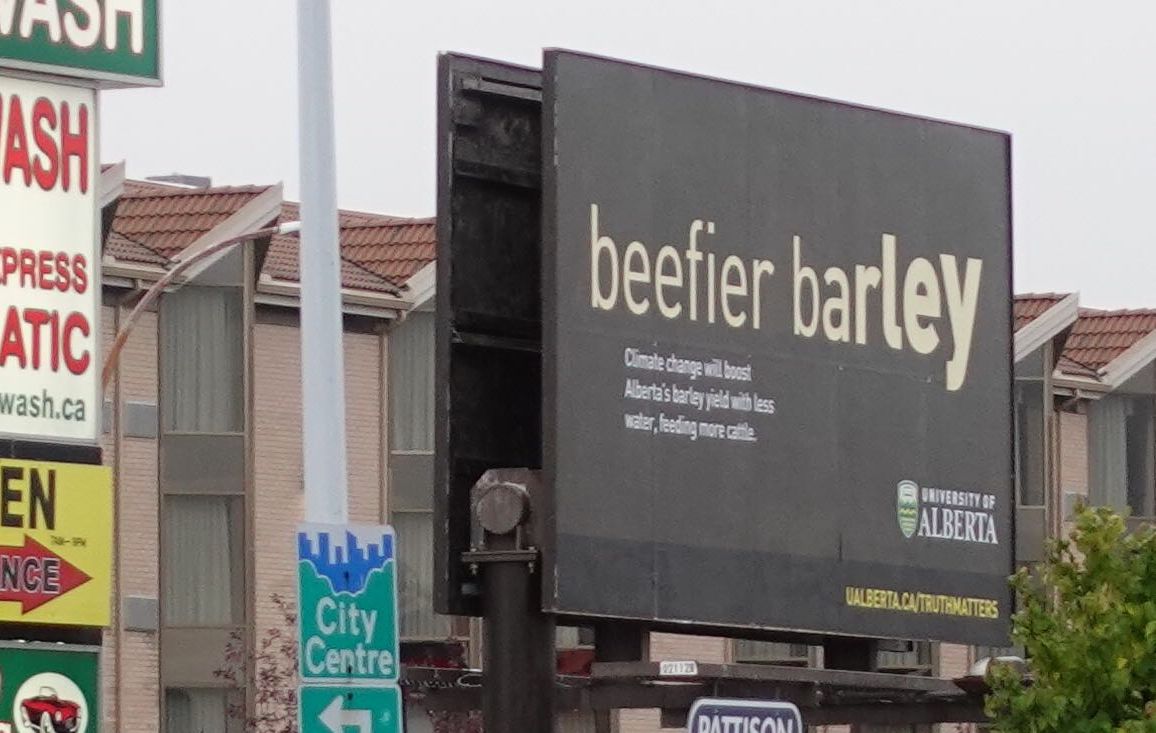Even as there’s growing consensus across the country that we need to be concerned about the environment, a billboard in Edmonton is talking about the potential benefits of climate change on the beef industry.

The billboard, located on 178 Street in the west end, reads in large letters “beefier barley,” with subheading saying, “Climate change will boost Alberta’s barley yield with less water, feeding more cattle.”
The billboard is part of a larger “Truth Matters” advertising campaign that the University of Alberta says has been running at different times since fall 2018.
“The goal of the Truth Matters campaign is to highlight University of Alberta research tackling today’s complex challenges, such as future potential impacts of climate change. This includes the research that is highlighted on the “Beefier Barley” billboard,” a statement from the university’s media relations team said.
Laurie Adkin, a Political Science professor at the University of Alberta, slammed the campaign on Twitter, calling it “twisted” and damaging to the institution’s reputation.
“This is seriously twisted, U of A,” she wrote. “Incalculable damage to our scientific and ethical reputation. An insult to your own faculty and students who work on the climate crisis. How are you going to repair this damage?”
Adkin spoke to Global News on Thursday about 100 Debates on the Environment, debates being held across the country to help voters understand where candidates stand on the issue of climate change.
The non-partisan coalition is calling for climate change to be the number one priority for voters at the ballot box this federal election.
Billboard ads, which promote several stories from the Truth Matters campaign, began running in Edmonton and Calgary in early September.

Get daily National news
The University of Alberta said other research discoveries highlighted in the “Truth Matters” campaign include organ transplantation, artificial intelligence, children’s health, renewable energy and atomic scale computers, among others.
READ MORE: Climate change is actually good for something – Alberta barley
Alberta’s most important feed crop for beef production will benefit from warmer temperatures and increased humidity, the U of A research said.
The study, which Global News first covered in January 2018, said climate change is likely to lead to an increase in rainfed barley yields over the next four decades.
Researchers pointed to more CO2 in the atmosphere, more rain in northern Alberta and an earlier southern snow melt.
The lead researcher was Monireh Faramarzi, an assistant professor and the Campus Alberta Innovates chair in watershed science at the department of Earth and Atmospheric Sciences.
Faramarzi, along with post-doctoral fellow Badrul Masud, carried out modelling for the years 2040 to 2064.
The goals of the study included helping the beef industry plan for the future in the face of climate uncertainty. The study also aimed to increase awareness of how climate change will impact water needs, looking at both risks and opportunities.
READ MORE: Canada positioned itself as a world leader on climate change — is it?
Overall, the environment is becoming a “consensus issue” in Canada, according to an Ipsos poll conducted on behalf of Global News this past weekend, which said climate change is the third-most important issue in the federal election behind health care and affordability.
However in Alberta, only 11 per cent of residents said climate change was among their top three election issues.
READ MORE: Canadians want to stop climate change — but half don’t want to pay an extra cent: Ipsos poll
When asked what issues are most important in determining how they would would vote during the election, 35 per cent of Albertans said the economy, 32 per cent said affordability and cost of living, and 26 per cent said jobs and unemployment.
Watch below (Sept. 26): A non-partisan coalition is calling for climate change to be voters’ top issue and it’s organized over 100 debates across Canada to find out where candidates stand. Laurie Adkin joins Jennifer Crosby.

— With files from Global’s Emily Mertz









Comments